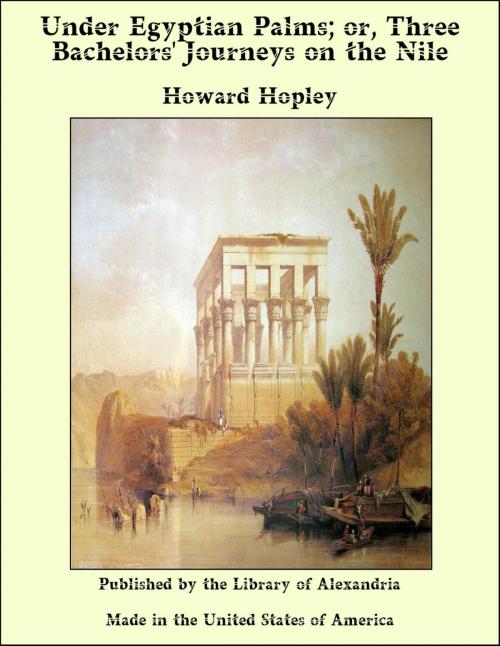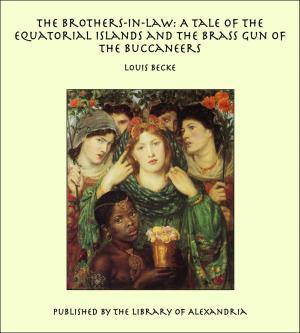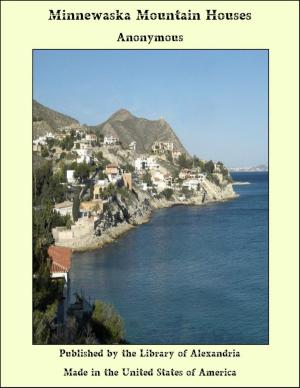Under Egyptian Palms; or, Three Bachelors' Journeys on the Nile
Nonfiction, Religion & Spirituality, New Age, History, Fiction & Literature| Author: | Howard Hopley | ISBN: | 9781465552280 |
| Publisher: | Library of Alexandria | Publication: | March 8, 2015 |
| Imprint: | Language: | English |
| Author: | Howard Hopley |
| ISBN: | 9781465552280 |
| Publisher: | Library of Alexandria |
| Publication: | March 8, 2015 |
| Imprint: | |
| Language: | English |
Ancient Egypt was an ancient civilization of Northeastern Africa, concentrated along the lower reaches of the Nile River in what is now the modern country of Egypt. Egyptian civilization coalesced around 3150 BC (according to conventional Egyptian chronology) with the political unification of Upper and Lower Egypt under the first pharaoh. The history of ancient Egypt occurred in a series of stable Kingdoms, separated by periods of relative instability known as Intermediate Periods: the Old Kingdom of the Early Bronze Age, the Middle Kingdom of the Middle Bronze Age and the New Kingdom of the Late Bronze Age. Egypt reached the pinnacle of its power during the New Kingdom, in the Ramesside period, after which it entered a period of slow decline. Egypt was invaded or conquered by a succession of foreign powers (such as the Libyans, Nubians, Assyria, Babylonia, Persian rule and Greece) in the Third Intermediate Period of Egypt and Late Period. In the aftermath of Alexander the Great's death, one of his generals, Ptolemy Soter, established himself as the new ruler of Egypt. This Ptolemaic Dynasty ruled Egypt until 30 BC, when it fell to the Roman Empire and became a Roman province. I HAD been to Egypt before, and on this, my second visit, I appointed to meet two of my old friends in Cairo, and with them hire a boat to proceed very leisurely about eight hundred miles up the river to the Cataracts of the Nile. Be not apprehensive; I have no thought, patient reader, of soliciting your continuous companionship through this long journey. I wish merely to take you up here and there; to invite you at intervals, "to a feast, now to a picnic, a wedding, a funeral; yes, even to a funeral! For why should we turn aside from what is an inevitable condition in this transitory order of things? In fine, to get you comfortably settled in an easy chair on deck, in the broad shadow of our lateen sail, swelling gently to the summer breeze; and there, of quiet sunny afternoons—heedless of the dreamy, murmuring current, which flashes and laps at our side—to look abroad and gather passing lessons as we are so borne on through the gliding landscape.
Ancient Egypt was an ancient civilization of Northeastern Africa, concentrated along the lower reaches of the Nile River in what is now the modern country of Egypt. Egyptian civilization coalesced around 3150 BC (according to conventional Egyptian chronology) with the political unification of Upper and Lower Egypt under the first pharaoh. The history of ancient Egypt occurred in a series of stable Kingdoms, separated by periods of relative instability known as Intermediate Periods: the Old Kingdom of the Early Bronze Age, the Middle Kingdom of the Middle Bronze Age and the New Kingdom of the Late Bronze Age. Egypt reached the pinnacle of its power during the New Kingdom, in the Ramesside period, after which it entered a period of slow decline. Egypt was invaded or conquered by a succession of foreign powers (such as the Libyans, Nubians, Assyria, Babylonia, Persian rule and Greece) in the Third Intermediate Period of Egypt and Late Period. In the aftermath of Alexander the Great's death, one of his generals, Ptolemy Soter, established himself as the new ruler of Egypt. This Ptolemaic Dynasty ruled Egypt until 30 BC, when it fell to the Roman Empire and became a Roman province. I HAD been to Egypt before, and on this, my second visit, I appointed to meet two of my old friends in Cairo, and with them hire a boat to proceed very leisurely about eight hundred miles up the river to the Cataracts of the Nile. Be not apprehensive; I have no thought, patient reader, of soliciting your continuous companionship through this long journey. I wish merely to take you up here and there; to invite you at intervals, "to a feast, now to a picnic, a wedding, a funeral; yes, even to a funeral! For why should we turn aside from what is an inevitable condition in this transitory order of things? In fine, to get you comfortably settled in an easy chair on deck, in the broad shadow of our lateen sail, swelling gently to the summer breeze; and there, of quiet sunny afternoons—heedless of the dreamy, murmuring current, which flashes and laps at our side—to look abroad and gather passing lessons as we are so borne on through the gliding landscape.















